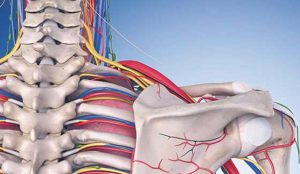By Dale Segal, MD


When you raise your arm above your head it’s your C5 nerve that sends an electric impulse from your brain through your spinal cord to your shoulder muscles. When you feel someone tapping on your shoulder to get your attention; that’s your C5 nerve sensing pressure on your shoulder and transmitting that signal into your consciousness.
When you experience shoulder pain, it is your C5 nerve responsible for sensing that miserable feeling.
Common sense tells us that shoulder pain is caused by a problem in the shoulder. Shoulder arthritis, rotator cuff tears, biceps tendinitis, subacromial impingement are all common causes of shoulder pain. Less commonly considered is compression of the C5 nerve causing referred pain to the shoulder.
Spine specialist commonly see patients with shoulder pain that are treated with therapy, injections, and surgery with limited success. There may be overlapping effects where shoulder treatment only partially alleviates symptoms with patients continuing to experience residual pain. These patients only come to find out later that their problem was a C5 nerve compression in the cervical spine all along.
Cervical radiculopathy is a condition caused by a compressed or pinched nerve in the neck. Cervical radiculopathy of the C5 nerve is a common cause of shoulder pain. Shoulder pain from C5 radiculopathy can occur with or without neck pain. If shoulder pain is not responding to conventional treatment, then a neck MRI should be obtained to evaluate the C5 nerve.
Clues that shoulder pain may be caused by a C5 radiculopathy include associated numbness or tingling in the arm or muscle weakness. Pain may be triggered by certain neck movements.
An orthopedic spine specialist can examine both the shoulder and neck to determine whether symptoms are the result of shoulder or cervical spine pathology. If compression of the nerve is identified, then treatment can be initiated and can result in complete resolution of shoulder pain. Clinicians and patients should always consider C5 radiculopathy in the diagnosis and treatment of shoulder pain.
Dale Segal, MD
Dr. Segal is a fellowship-trained spine surgeon specializing in minimally invasive and complex spine surgery. He completed a spine fellowship at Harvard University- Massachusetts General
Hospital and Brigham & Women’s Hospital. He grew up in New York and graduated Summa Cum Laude from the University of Albany with a degree in biochemistry and molecular biology. He was awarded the John T. MacDonald scholarship to attend Florida International University where he obtained his medical degree and graduated with Alpha Omega Alpha honors. He completed his residency at Emory University and served as chief resident at the Emory Orthopedics and Spine Hospital. As a dedicated spine surgeon, he devotes his practice to the diagnosis and treatment of spinal disorders. His interests include minimally invasive, motion sparing techniques, degenerative diseases, navigation and robotics, deformities, fractures, and complex revisions. He has authored numerous peer-reviewed journal articles, book chapters and presented at national and international conferences. He is a member of several spine and orthopedic societies including NASS, AAOS, AOA. In his spare time, he enjoys spending time with his family, watersports, scuba diving, and hiking.
Call to schedule your appointment today.
Orthopedic Specialists of SW Florida
239-334-7000 | www.osswf.com
2531 Cleveland Avenue, Suite 1
Fort Myers, FL 33901
 Southwest Florida's Health and Wellness Magazine Health and Wellness Articles
Southwest Florida's Health and Wellness Magazine Health and Wellness Articles

